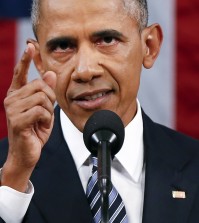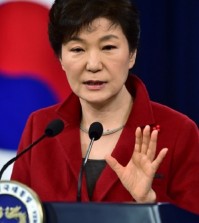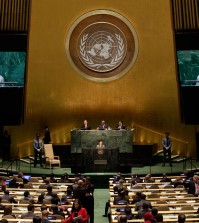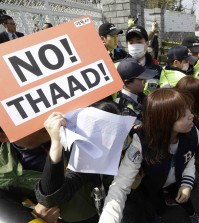- California Assembly OKs highest minimum wage in nation
- S. Korea unveils first graphic cigarette warnings
- US joins with South Korea, Japan in bid to deter North Korea
- LPGA golfer Chun In-gee finally back in action
- S. Korea won’t be top seed in final World Cup qualification round
- US men’s soccer misses 2nd straight Olympics
- US back on track in qualifying with 4-0 win over Guatemala
- High-intensity workout injuries spawn cottage industry
- CDC expands range of Zika mosquitoes into parts of Northeast
- Who knew? ‘The Walking Dead’ is helping families connect
South Korea asked to join Russia ban

Peter Harrell, deputy secretary for counter threat finance and sanctions at the U.S. State Department, arrives at the Ministry of Foreign Affairs on July 29, 2014, for a meeting with officials over sanctions against Russia. (Yonhap)
(Yonhap) — A high-ranking U.S. sanctions official asked South Korea Tuesday to join Washington-led efforts to impose tougher sanctions against Russia, sources in Seoul said.
Peter Harrell, deputy secretary for counter threat finance and sanctions at the U.S. State Department, made the request during a meeting with South Korean foreign ministry officials, according to the sources.
He arrived in Seoul on Monday for a two-day visit aimed at informing Seoul of Washington’s recent moves to slap sanctions on Russia following Moscow’s recent meddling in Ukraine and its suspected involvement in the downing of a Malaysian passenger jet earlier this month.
Explaining the recent U.S. sanctions, Harrell highlighted the importance of South Korea joining the punitive action, the sources said on condition of anonymity.
The U.S. has taken a series of sanctions against Russia’s oil, gas and bank sectors since the start of the Ukraine crisis in March.
Harrell also briefed South Korean officials on Washington’s future sanctions plan, the sources noted.
In addition to the punitive action related to the Ukraine issue, the U.S. reportedly called for Seoul’s cooperation in the on-going Western moves to punish Russia for its alleged involvement in the shooting down of the Malaysian flight MH17 earlier this month.
On July 17, Malaysia Airlines flight MH17, while en route from Amsterdam to Kuala Lumpur, was shot down by a surface-to-air missile in war-torn Ukraine, killing all 298 people on board, with many in the international community believing that Russia played a role in the attack.
On Monday, the U.S., Germany, Britain, France and Italy agreed to impose joint sanctions targeting Russia’s energy, arms and financial sectors.
Seoul reportedly conveyed its official stance over the Russian issue to the U.S. side in the Tuesday meeting and checked possible repercussions the Western countries’ anti-Moscow sanctions would have on South Korean firms.
Seoul has previously denounced Russia for its annexation of what has been Ukrainian territory, but its commercial and diplomatic relations with Russia have been keeping Seoul from taking any concrete punitive steps.
Harrell also met with finance and economy ministry officials as well as local commercial bank officials before leaving the country later in the day. Harrell will fly to Singapore late Tuesday, with plans to visit Japan later this week.
A senior official from the State Department said that the U.S. had “full and fruitful discussions” with the Korean government, without elaborating.
“I don’t want to single out any international partner, but we certainly hope that all of our international partners will join us in sending a clear message to Russia,” he told a group of reporters, asking not to be named.
The official said that sanctions on Russia would also incur some costs to the U.S. and its allies, but he stressed that if the international community does not take action, it could face “much greater costs.”
“It is important to look (at) not only the costs we are bearing but also what cost we would bear if we did not act,” he noted.
















